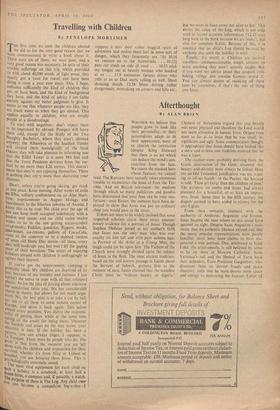Travelling with Children
By PENELOPE MORTIMER
To start with negatives: don't expect them to be impressed by abroad. Pompeii will leave them cold, except for the Study of the Two Naughty Bachelors, where they aren't allowed anyway; the Alhambra or the Saadian Tombs will remind them nostalgically of the local Odeon; they will take pleasure in informing you that the Eiffel Tower is a mere 984 feet and Ithat the Torre Pendente deviates from the ver- tical by no more than 4.26 metres. This doesn't Mean that they're not enjoying themselves. There is nothing they enj 'y more than shattering your illusions.
'Don't, unless you're going ski-ing, get stuck in one place. Keep moving. After weeks of exile on Elba, solitary confinement on an Alpe Mari- time, imprisonment in August Malaga and banishment to the Siberian suburbs of Ascona, I know this to be true. No child over the age of five can keep itself occupied ,indefinitely with a bucket and spade, and no child under twelve wants to lie in the sun getting status-symbol strap-marks, Pedalos, gondolas, flippers, masks, juke-boxes, ice-creams, gallons of Coca-Cola, visits to the cemetery or to a dubbed version Of some old Doris Day movie—all these, every day, Will bankrupt you, but won't fill the gaping maw of their boredom. The secret of enjoying holidays abroad with children is unflaggingly to agitate their interest.
If you've got the temperament, camping is , probably ideal. My children are deprived of its 101's because of my timidity and laziness; I just haven't the nerve to cope with all that coloured plastic. As for the idea of driving about wherever the wanderlust takes you, this has considerable charm in theory, but allows for too much argu- nent. No, the best plan is to take a car by rail, sea or all three to some remote corner of urope, and drive it back again. This solves almost every problem. You shelve the responsi- bilityuf getting there while at the same time taking all the credit for being there; 'whatever tn.e. hazards and crises on the way home, your objective is sure. If the holiday has been a success, you can always linger, 1 suppose, in Le.Touquet. There must be people who do. The point is that from the moment you are left „„"e With the children and responsible for their survival, whether it's from Nice or Lisbon or Istanbul, you are bringing them home. This is psychologically extremely sound. such most vital equipment for each child on dozen a holiday is a notebook, at least half a biros, a compass and, if possible, a watch. 12_e Purpose of these is The Log. Any child over "c can become a compulsive log-writer—I
suppose it stirs their rather sluggish spirit of adventure and makes them feel in some sort of danger, which they frequently are. 'At 10.16 we venture on to the Autostrada . . . 10.22• pass car crash on side of road . . . 10.35 stick my tongue out at beastly woman who honked at us . . . 11.9 encounter furious driver who yells at us so Dad starts yelling as well. Short shouting match. 12.38 Mum driving rather dangerously, overtaking on corners and hills etc.,
but we seem to have come out alive so far.' This shows the value of the Log, which is not only used to record accurate information (`1 2.43 start long walk to the bank because we are broke'). but also for complete fiction: Because of this. it is essential that no child's Log should be read by anybody else until the holiday is over.
Finally, it's • worth it. Children are natural travellers—unimpressionable, tough, anxious to learn -anything they aren't actually taught. But if you want my advice about that unspoilt little fishing village just outside Cannes—avoid it. You can always dream of sneaking off there later by yourselves, if that's the sort of thing you fancy.






































 Previous page
Previous page